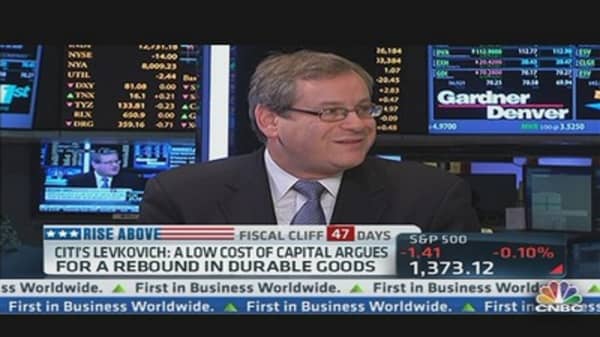Despite all the scary talk about the "fiscal cliff," investors aren't trading stocks as if they're petrified of it, Citigroup U.S. equity strategist Tobias Levkovich told CNBC's "Squawk on the Street" on Tuesday.
"The fiscal cliff — which is huge — everyone kind of thinks government officials will figure it out albeit in ugly fashion," the Citigroup strategist said. The fiscal cliff refers to the $600 billion in automatic tax hikes and spending cuts that will kick in at the end of the year, if a deal isn't otherwise reached.
U.S. equities may already be discounting much of the uncertainty surrounding the fiscal cliff, Levkovich said. "The question is can we get out of our way. If we get a solution in December, markets probably would rally," he said. (Read More: Markets Fear 'Profits Cliff,' Not 'Fiscal Cliff': Strategist.)
Levkovich noted the higher equity risk premiums that have been in place since the 2008-2009 financial crisis and compressed multiples as reasons the markets may move higher.
"If we assume there's never earnings growth, and turn the market into an annuity, probably about 94-95 percent of the market's value is attributable to zero growth in earnings between now and eternity," Levkovich said. "That's an unusual circumstance and there's probably a 90 percent chance the markets are up 12 months later."
The strategist remains worried about Europe and stocks that have exposure to the region. With European economic data worsening and credit getting much tighter, "Europe might have another difficult year next year," Levkovich said, noting that Citigroup is forecasting a recession in 2013.
He would avoid autos, materials and capital goods stocks that have large cyclical exposure to Europe.
Instead, investors should continue to park their money in dividend stocks, Levkovich advises, even if tax rates go up next year. "You're still better off because dividend yields are higher than bond yields today," he said.





